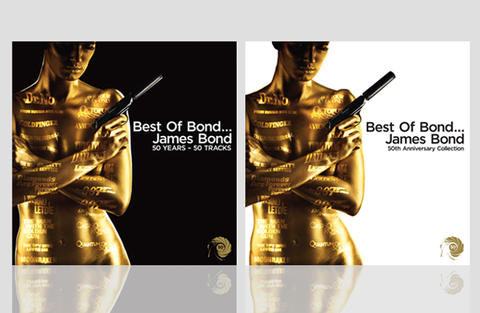This post is the second in a five part series.
Dr. No
We’ve already talked about the James Bond theme, which makes up only a portion of the opening credits. The movie is actually very lightly scored and instead incorporates lots of songs, mostly Jamaican/Caribbean flavored, as thematic undercurrents and source music. Contributions such as “Three Blind Mice” and “Underneath the Mango Tree” are almost confections as they stand alone, but have lyrical relevance to the action on screen.
From Russia With Love
Matt Monro’s song is actually not an opening-credits theme but one for the closing credits. Barry scores the lush visuals of the opening credits to a jazzy, funk-organ laden riff on the same song before segueing into the bombastic brassiness of the James Bond theme. There is a third theme, one of my personal favorites, simply titled “007” that makes it’s debut in this film and continues to serve as Connery’s alternate Bond theme throughout the 60s. It makes a brief reappearance during the boat chase along the Amazon in Moonraker, but sadly hasn’t been heard from since.
Goldfinger
Simply the best. A big, bombastic opening credits pop song wailed by Shirley Bassey played over visuals of the film projected onto gold-painted women. The lyrics highlight the villain, carrying a sinister tone as he “beckons you to enter his web of sin.” Goldfinger is regarded by most as the greatest entry in the entire Bond franchise. The title song and the score are no less.
Thunderball
Riding the crest of the wave, Thunderball was Bond at his most popular. The machinery was now humming at full speed. Budget allowed for the producers to experiment with musical ideas and jet-pack those they didn’t like out of film history. The result was a title track that played it safe. Similar in brassy tone to “Goldfinger” and sung with full gusto by future Vegas lounge-lizard Tom Jones, Thunderball works fine as a Bond theme. But the lyrics are almost nonsensical in relation to the plot. Forceably shoe-horning the word “Thunderball” as a description of our hero’s larger-than-life attitude, it suggests the lyricist didn’t even bother to read the book or the screenplay in advance. “Thunderball” is also the least daring of some other options that were on the table. Relegated to the cinematic equivalent of a B-side is “Mr. Kiss Kiss Bang Bang” available in two different recordings. The official version, sung by Dionne Warwick, would become part of of the official soundtrack while a rawer version in a different key, wailed once again by Miss Shirley Bassey, would be unearthed for Bond’s 30th anniversary soundtrack. “Mr. Kiss Kiss Bang Bang,” a reference to what Bond was called in Japanese circles at the time, makes far more lyrical sense regarding our hero.
The boldest would-be theme though was not accepted and remains outside the official canon. Johnny Cash’s “Thunderball” is ripped from the plotline and conveys the gravity of the plot, but to the tune of the least Bond-like motif of all: Desperado Country-Western. Seek this song out and add it to your collection of Bond tunes. It won’t disappoint.
You Only Live Twice
Musical creativity continued in Bond’s fifth outing. Setting aside the pomposity of the previous outings, a kinder, gentler theme was sought. Congruous with the Asian themes of the plot, Barry explored incorporating Asian sounds into the theme song. An admirable attempt with Leslie Bricusse was passed over but eventually resurfaced on the 30th anniversary soundtrack. The final official theme, while similar in tone to the demo, was an entirely different song. In fitting with the new approach this song was not wailed, but crooned by none other than the daughter of the world’s greatest voice. Nancy Sinatra, backed by Barry’s strings, delivers a genuine, earnest single that wouldn’t be rivaled for another decade.
On Her Majesty’s Secret Service
Changes were afoot in the Bond franchise. Connery set down his Walther PPK and a new actor was charged with picking it up. One of the most challenging journeys for the character was also about to unfold. With all these changes going on, a new main theme was scored to move Bond forward while at the same time hearkening back to the early “spy sound” days of the early films. Barry constructed a fresh instrumental featuring a combination of Vox synthesizers for a modern feel and alpen horns for a low, classical warmth befitting a plot mostly set in the heart of Switzerland.
Bond in love required a proper love theme, and jazz trumpeter extraordinaire Louis Armstrong was contracted to deliver. And deliver he did. Just as the films plot and Lazenby’s take on Bond hewed more closely to Fleming’s novel, “We Have All the Time in the World” conveyed the beauty of Bond and Tracy’s romance is portrayed with all its sweetness while forshadowing the tragedy of those words. OHMSS profoundly closed the most profound decade in the franchise.
Next Article: The 70s

